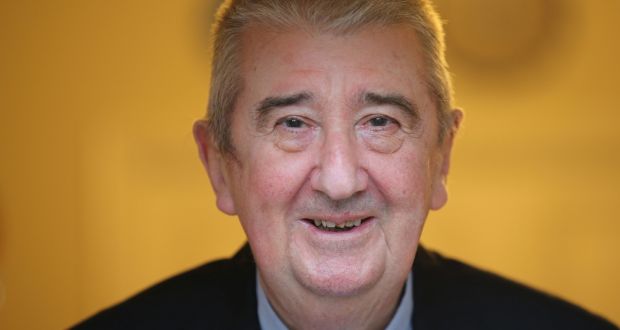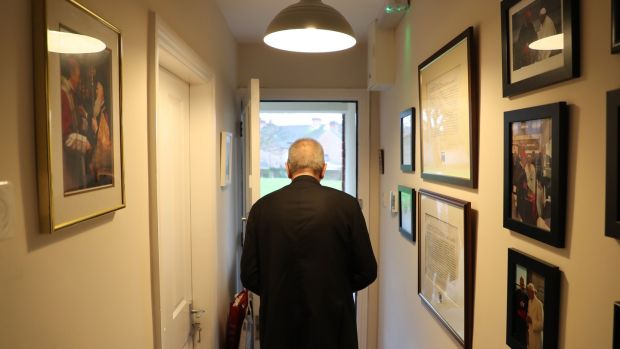Archbishop Diarmuid Martin: ‘we’ve to Be Careful to Ensure We Never Slip Back’
By Patsy McGarry
Pope Francis once quietly approached the Archbishop of Dublin, Diarmuid Martin, in the Vatican guesthouse, the Santa Marta, at the end of an early morning Mass. “I often think of you, you got a very difficult chalice. I’m sure there are nights you go to bed and you say to yourself why did I not stay in Geneva?” he told the Dubliner. During his 17 years at the helm in Dublin, it is a question that Martin, who steps down finally as archbishop next week, could have been forgiven for asking himself, and more than once. He was appointed coadjutor archbishop in 2003, becoming archbishop the following year at a time when the Catholic Church in Ireland was reeling in the face of a swathe of allegations of clerical child abuse. However, he disputes the notion that he was sent by Pope John Paul II* back to Dublin from Geneva in 2003, where he had been the Vatican’s permanent observer at the UN, to “sort out Dublin”. Nevertheless, he remembers the attitudes prevailing on his arrival, as shown by a canon lawyer who said it would be “impossible” for bishops to cede powers to a national board for the protection of children. “That was written, maybe in 2004, and you see the changes that have taken place. It shows there was this mentality,” he tells The Irish Times in his final interview as archbishop. The attitudes towards him personally were shown by the small things, including an invitation that never came to join a get-together at the Archbishop’s House in Drumcondra. “They simply decided I wasn’t part of them. That’s classic institutions. People had great affection for Cardinal [Desmond] Connell and he was a kind man. And he was a good man. He might have been slow in dealing with certain things but he was the one who committed himself in the end. He came from a different world,” says his successor. The first meetings he had with priests about child protection in Dublin were little better. In fact, they “were terrible. People said to me ‘If you were here, you’d have been worse.’ “I did have the advantage, being a Dubliner, I knew a lot of the priests. I’d be friends with a lot of the priests. It’ll be more difficult for my successor, he doesn’t know the priests.” Back then, “some people in the church were very worried that I was a loose cannon and God knows what I’d do next. But basically what I did, everybody’s doing now and everybody’s being told to do it,” he says. Looking back over his time, he says his worst day came “very early on, when he met the parents of a victim: that really shattered me. It was one of the first. It was almost violent, dreadful, dreadful.” The Commission of Investigation into the Dublin Archdiocese, headed by Judge Yvonne Murphy – who also led the mother and baby home inquiry – “did a great service to us”. “We are fortunate to have had that commission some time ago. We were able to put a lot of order on our house. We have in the Irish church today good structures. We’ve to be careful to ensure that we never slip back.” Once it was set up in 2006 to investigate the handling of clerical child sex abuse allegations in the Dublin archdiocese, Martin made the decision immediately that he would fully co-operate with it. “A lot of people were unhappy. People said to me you must remember what you are doing, the effects it could have elsewhere, the church can manage these things on its own. But we had to come to the idea that the abuse of children was a sin, it was a crime in civil law and was a crime in canon law. I didn’t want to keep a secret archive in my house, of crimes. I co-operated.” He praises Justice Murphy, and not just for her “very factual” final report: “She’s a very good person. Her husband [the late Supreme Court judge Adrian Hardiman] said to me ‘you’re lucky you’ve got Yvonne’.” Prior to its publication, people who gave evidence were entitled to see drafts relevant to themselves, for accuracy purposes. “A lot of people, leading church figures, were very unhappy.” It was a very strange culture. People looked on child abuse like a priest who had a problem with ‘the bottle’ He offered anyone mentioned, “any bishop or priest” support and legal advice: “One or two decided to use their own lawyers because they didn’t have confidence in me. The results that came out were the same. They couldn’t blame me. In one case the legal costs were extraordinary, for one individual who claimed he was badly treated.” Those costs were covered by the archdiocese. However, his personal relationship with some people in the archdiocese never recovered in the wake of the Murphy Report, now just one of a number of inquiries that probed the Catholic Church. “In general, though, I think people recognise that it wasn’t easy for me, but more and more priests are saying to me we were very lucky that we did it that way.” Since announcing his retirement he has had “lots of letters” from priests “saying that, when you look back I provided leadership in difficult situations and that sometimes it must have been very hard”.
“It can be a lonely task. You have to take decisions and at times there are certain things you simply can’t share with other people,” he tells The Irish Times. There were “one or two vocal critics but I never went after critics. I’ve never taken action against a priest who disagreed with me, even publicly.” It was “a very strange culture. People looked on child abuse like a priest who had a problem with ‘the bottle’. There was no understanding of the effect on the child,” he says. As to suggestions that he was not very impressed with his fellow bishops, particularly in those early years, he says: “I was worried about the mechanism of the bishops’ conference.” It was the case that “a lot of things happened, a lot of intrigue. One of the things that gave me my independence was that I put my foot in Maynooth for the first time as a bishop and I was never in the Irish college.” The bishops’ conference “was landed with problems. There were two big diversions for the Irish church in its management: one was child sexual abuse; the other was Northern Ireland. “It may seem a very strange thing to say but while we were rightly involved in addressing those the most, we were forgetting the real problem was that the church was slipping out of our hands. We hadn’t the time to deal with that.” In the future, the “real presence” of the Catholic Church in Irish society will “be through individual Christians”, rather than institutional groupings or the hierarchy. “We have to have a new generation of individual Christians and church institutions which know how to live as fully Christian and committed Christians in a secularised world. We’ve to find a way to use church language, not to impose it, so that people will come to say there’s something there we should be listening to. We have extraordinarily good priests, a middle generation of priests who I have great admiration for and I know they are the ones who will have to bear the burden and the challenge,” he says. Now, he believes they will “rally round” the new archbishop, Dermot Farrell, though the latter starts with a disadvantage in that he studied in Maynooth, not Clonliffe, and thus does not know many of his new team. In the future, the Catholic Church should voluntarily remove itself from some quarters of Irish life, including “some schools”, but this must not become exclusion. That would be “wrong”, he says simply. The issue of Catholic involvement in hospitals are not ones of ethics, but rather of equality: “The big healthcare problems aren’t just some of the ethical issues, which are there. The big one is about access to health. “I believe the spirit of those who founded the nursing orders was care for the poor. If the church finds itself just running institutions for the wealthy, that isn’t what it should be,” he says. Martin has had many good dealings with politicians: “I must say in the beginnings of this lockdown, [Leo] Varadkar was very helpful personally and very understanding. We came up with this rather unusual situation of large churches with only 50 people being allowed, and came up with these ‘bubbles’. To a great extent [he] pushed that.” So far, he says, he does not know Varadkar’s successor in the taoiseach’s office, Micheal Martin, “as well”, adding that he had “a good relationship” with Enda Kenny, too. However, he was disappointed by Kenny’s decision to close off the Irish embassy to the Holy See in 2011. “I think it was probably a wrong decision. “The embassy wasn’t a flag for Irish Catholicism around the world. I have great regard for Irish diplomats, I think they’re top quality and the ones I would’ve known at the Holy See were, but they’re doing diplomatic work and diplomacy is very useful in crisis moments.” He had “a good relationship with presidents. I had great regard for them, Mary McAleese, including the current man. We’re very fortunate to have him. I have a good relationship with Mary Robinson. I have a very high regard for her, there’s an affection there.” Of the popes, he says: “Pope Benedict was always particularly kind and thoughtful to me, listened to what I had to say. We always spoke German. It made a difference. Probably the relationship was closer, a more personal one. I didn’t know Francis at all.” Wishing good fortune to his successor, he believes Dermot Farrell, who takes over formally on Tuesday, will have “to build his own team and not to be looking to any establishment, whether it’s an internal establishment or cliques or friends or people of a certain generation. “He has to be a charismatic figure of some kind and he has to maintain his autonomy. It’s up to him.” Having had many difficult days in the post, Archbishop Martin is asked for his happiest day: “I’m not too sure, the day I resigned?” he suggests, with a laugh. “No, I had enjoyable days. “The pilgrimage to Lourdes was an amazing thing. I got on well with Dubliners and I think that will probably be one of the things that I, despite the fact that I had lived abroad, I never managed to suppress.” His decision to retire at 75 was not because he was “anxious to get out, or because I didn’t like what I was doing, [or] didn’t feel I was doing a good job, but I’m getting tired, I’m getting old”. “The last year, in many ways, was probably the most difficult because I couldn’t go out and I feel that the delay in making the appointment damaged the church. Decisions couldn’t be taken,” he says. Retiring in the north inner city parish of Aughrim Street, he plans to rest and read for now. “I’ll be able to help out in this parish, there’s a convent down the road as well. I want to take it easy for a while. I could write my memoirs but they’d probably be banned. I could write ponderous articles,” he says, with a smile. He has “generations of friends” in Rome he hopes to see, pandemic allowing, and old acquaintances, “letters from people I haven’t seen in years, not many from ecclesiastics”. *This article was amended on January 30th, 2021
|
.
Any original material on these pages is copyright © BishopAccountability.org 2004. Reproduce freely with attribution.

